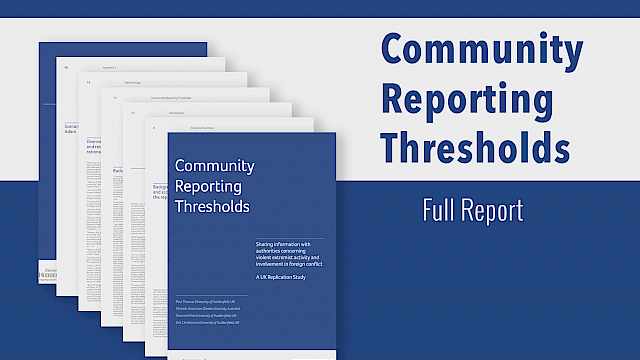
Community reporting of violent extremist activity and involvement in foreign conflict
The first people to suspect or know about someone involved in acts of violent extremism, including planned or actual involvement in overseas conflicts, are often those closest to them: their friends, family and community insiders.
This project, from the University of Huddersfield in partnership with Deakin University in Australia, seeks to build on previous Australian-based research to gain new knowledge about the dynamics and barriers to community reporting in the UK, in order to develop a new, localised, and contextually sensitive understanding of and approaches to community reporting issues. It replicates the Australian study with a significantly increased sample size and extends sampling to include a sub-sample of White British community respondents.
The research methodology and questions seek to understand and assess the experiences and views of those who would consider sharing concerns about ‘intimate’ others with authorities concerning suspected involvement in extremist activity at home and/or in planning to travel abroad to take part in violent conflicts.
The study uses qualitative inquiry, with semi-structured in-depth interviews for community respondents and government key informants. Community and state professional respondent groups are drawn from three major metropolitan conurbations at the forefront of counter-terrorism policy efforts through the Prevent strategy.
Research questions
- What are the triggers, thresholds, and barriers for when someone would consider reporting?
- What is the experience of (considering) reporting on an individual who may be involved in violent extremism, from the reporters’ perspectives?
- What can these insights tell us about how bystander reporting campaigns should be developed, and what approaches might be most successful with particular individuals?
Project resources
Academic Publications
Obstacles and facilitators to intimate bystanders reporting violent extremism or targeted violence
The first people to suspect someone is planning an act of terrorism or violent extremism are often those closest to them. Encouraging friends or family to report an “intimate” preparing to perpetrate violence is a strategy for preventing violent extremist or targeted mass violence. We conducted qualitative-quantitative interviews with 123 diverse U.S. community members to understand what influences their decisions to report potential violent extremist or targeted mass violence. We used hypothetical scenarios adapted from studies in Australia, Canada, and the United Kingdom. Factors influencing reporting decisions include fears of causing harm to the potential violent actor, self, family, or relationships; not knowing when and how to report; mistrust of law enforcement; access to mental health services; and perceptions that law enforcement lacks prevention capabilities. White and non-White participants were concerned about law enforcement causing harm. Participants would contact professionals such as mental health before involving law enforcement and Black-identified participants significantly preferred reporting to non-law enforcement persons, most of whom are not trained in responding to targeted violence. However, participants would eventually involve law enforcement if the situation required. They preferred reporting in-person or by telephone versus on-line. We found no difference by the type of violent extremism or between ideologically motivated and non-ideologically motivated violence. This study informs intimate bystander reporting programmes in the U.S. To improve reporting, U.S. policymakers should attend to how factors like police violence shape intimate bystander reporting. Our socio-ecological model also situates intimate bystander reporting beside other population-based approaches to violence prevention.
(from the journal abstract)
Eisenman, D. P., Weine, S., Thomas, P., Grossman, M., Porter, N., Shah, N. D., Polutnik Smith, C., Brahmbhatt, Z. & Fernandes, M. (2023) Obstacles and facilitators to intimate bystanders reporting violent extremism or targeted violence, Critical Studies on Terrorism 10.1080/17539153.2023.2269011
Bystander reporting to prevent violent extremism and targeted violence: learning from practitioners
The willingness of friends or family to share concerns about an ‘intimate’ preparing to perpetrate public, mass violence, such as violent extremism or targeted violence, is considered a possible part of preventative strategies. To understand what is needed to help intimate bystanders share information on potential acts of violent extremism or targeted violence, we conducted 25 semi-structured qualitative interviews with experts in intimate bystander reporting, including law enforcement, social service and mental health providers, faith-based leaders, staff in school threat assessment programs, and community practitioners in California and Illinois. Results showed reporting was impeded by multiple factors, including lack of knowledge about violent extremism and reporting processes, fear of being incorrect, difficulty distinguishing between violent extremism and mental illness, low trust in law enforcement, and lack of standardized reporting processes. Practitioners said reporting could be improved by several interventions, including increasing awareness about reporting processes, improving reporting methods and policies, training community members who can take reports, and increasing trust between community members and law enforcement. Improving bystander reporting for targeted violence and violent extremism in the U.S. requires collaboratively strengthening law enforcement and community capacities based on sound theory, best practices, and monitoring and evaluation.
(From the journal abstract)
David P. Eisenman, Stevan Weine, Nilpa D. Shah, Nicole V. Jones, Chloe Polutnik Smith, Paul Thomas & Michele Grossman (2022): Bystander reporting to prevent violent extremism and targeted violence: learning from practitioners, Behavioral Sciences of Terrorism and Political Aggression, DOI: 10.1080/19434472.2022.2130960





